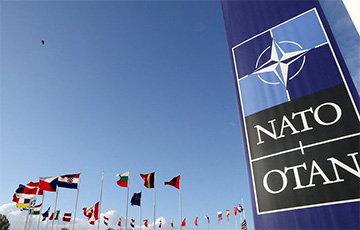Senior Fellow At Hudson Institute: NATO's Might Will Defeat Lukashenka's And Russia's Forces
5- 29.08.2023, 16:48
- 14,494

How should NATO react to the provocations by Minsk and Moscow?
Luke Coffey is a security expert at the authoritative research organization Hudson Institute and a former adviser at the UK Ministry of Defence. He spoke in an interview with Charter97.org about what the final process of dismantling the Soviet empire means and how NATO can react to the aggressive actions of the Belarusian and Russian regimes.
– Was the failed Prigozhin's mutiny a precursor of things to come in Russia or was it an exception?
– I don't think what we saw was either a precursor or an exception. It was a continuation of the dismantling of the Soviet Union, just another chapter in this process that has been going on in some form since 1991.
I don't believe that the Soviet Union collapsed in 1991. I think the process started back then, and we are still seeing the process play out today. Historians 200 years from now will probably identify Russia's large-scale invasion of Ukraine in 2022 as the most consequential moment of this collapse.
When you look around the region, whether it is Tskhinvali, Abkhazia, Transnistria, the fighting between Armenia and Azerbaijan over Nagorno-Karabakh, the fighting that occasionally takes place between Tajikistan and Kyrgyzstan over its border — we are seeing the Soviet Union still collapsing. Prigozhin's attempted coup was just part of this process.
– Do you think that F16s would make the difference in the offensive?
– It would make a difference, but it wouldn't make the difference. It would play a role in improving the situation. But there are a lot of things the Ukrainians need right now. I would say what the Ukrainians need most is we Western patience and resolve.
There are some people who are suggesting that because there's this perceived slowness of the counteroffensive that future weapon supplies should be limited or even stopped. This is the wrong way of looking at it. I think we should understand that these counteroffensive operations are very complex and will take months. And while progress might be slow at first, it could quickly change and the counteroffensive will be over when it's over. In the West, we should be continuing our support for Ukraine and understanding that the support will be needed for probably years.
Do F16s play a role in this? Absolutely. But so would ATACMS, so would boosting our manufacturing capability for 155mm artillery shells — there is a whole bunch of things that we can be doing more of that we are not.
– Your expectation is that the war will drag on for years?
– At the current rate, Yes. The Ukrainians are nowhere near ready to give up. If Ukraine stops fighting, Ukraine stops existing, and they realize this. Polling in Ukraine shows that above 90% do not want any territorial concessions to the Russians. The US and our allies and partners in Europe and around the world need to continue supporting Ukraine in this endeavour. As long as the Ukrainians want to fight, we should be supporting them. This benefits US national interests and it costs the United States nothing in the big picture.
– Why has Putin decided to deploy nuclear weapons to Belarus? Is it a distraction, a smoke screen, or a genuine threat towards the West?
– In terms of a genuine threat towards the West, I don't know what nuclear missiles could do being in Belarus that they couldn't do being a few hundred kilometers to the west or to the east in Russia. I think this is all symbolic. If a nuclear weapon is launched from Belarus or if it is launched from Russia the distances are so short I don't know practically what difference that would make and the outcome. But symbolically the Kremlin knows that Western policymakers are very worried about nuclear escalation, and moving nuclear weapons to Belarus is a way for Russia to deter Western policymakers from taking certain decisions. This is a deterrence measure that comes at a very low cost for Russia. In fact, there are benefits to it because it makes Lukashenka more subservient to the Kremlin.
– How should NATO react to the recent aggressive moves by Putin and Lukashenka in Belarus (deployment of nuclear weapons, violation of Polish airspace, military drills close to the Polish border)?
– We should continue bolstering the defensive position on the eastern front of NATO. Poland, Lithuania and Latvia are key to all of this, but I would say the whole eastern front from northern Finland down to the Black Sea needs to be bolstered. We should make it very clear that any incursion or any attack on a NATO member would bring the full might of the alliance into the conflict to defeat Belarusian forces or Russian forces if they attack NATO.










